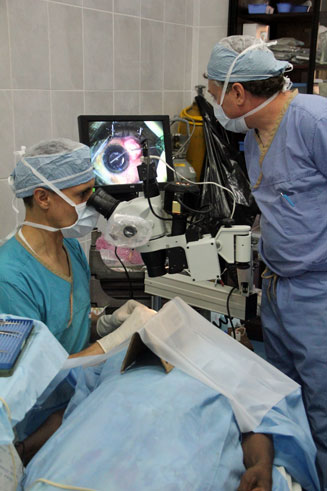
ecuador
Perspective on Learning MSICS from a Phaco Surgeon
By Dain Brooks, MD
Plano, TX
A Perspective on Learning MSICS from a Phaco Surgeon
I just returned from a great surgical mission trip to Ecuador. Dr. Stan Pletcher was my mentor for my first mission doing Manual Small Incision Cataract Surgery (MSICS) and was a great spiritual and surgical leader of the team. In a nutshell, it was an incredible experience personally for me and learning to do MSICS was a wonderful experience. I hope to share a few points that may be helpful as others contemplate embracing mission experiences doing MSICS.
If you feel a desire to learn and perform MSICS and help others receive sight, consider yourself invited to embrace this great experience. There is tremendous need for a very good cataract procedure where phacoemulsification technology is either not available or too expensive to provide to the masses that need surgery. MSICS is the perfect surgery for much of the world: it is inexpensive, effective, produces minimal astigmatism, sutureless, safe, relatively quick to perform and is relatively simple to learn with good instruction.
For a phaco surgeon, there is a natural transition to learning MSICS. Once you learn MSICS, you will also become a better phaco surgeon, particularly in improving your quality of incisions and manipulating the lens within the eye. You will learn how to become a better chop surgeon since you’ll understand the lens dimensions to a greater degree through your experience. As with phaco, the effectiveness of the preceding step greatly impacts the succeeding steps. In particular, the incision and tunnel are the most crucial elements to the surgery and will set you up for success as you move forward in the surgery. For example, if there is early entry into the anterior chamber, the iris will prolapse make for a difficult case. Alternatively, if the incision is too anterior, a button hole and incision leaks can occur.
Training to do MSICS is important prior to doing your first cases. There are wonderful resources available through www.globalsight.org. The book by the Arivand Eye Hospital is available on the iPad which also helped the surgeons on our trip prepare well.
It is important to have a good mentor in learning MSICS. I am indebted to Dr. Stan Pletcher for his time, patience and attention prior to surgery and observing me during surgery. He provided valuable feedback which helped me tremendously. Your mentor will help you select appropriate cases to start with so you can experience success early in the process of learning MSICS. For example, you may not want to start with a cataract that is too soft or too large and hard.
Besides the incision being very different from phaco, prolapsing a large brunescent nucleus from the bag may not be a technique you are familiar with as a phaco surgeon. Yet this is another crucial step in the surgery. There are a variety of ways to do this. With a little experimentation, you’ll find a way that works for you and it will get much easier to do this step the more cases you do. You’ll also become adept at making a large rhexis and likely a good can-opener rhexis. I needed to do both in my trip due to the variety of cases we were exposed to.
With any surgery, learning how to deal with the complications is just as important as knowing how to prevent them. This is particularly true with MSICS. Especially early on, you will likely be challenged as you deal with complications. They will occur and a positive attitude is important. Don’t get discouraged. After a tough case, you may benefit to take a breather and gather yourself before starting your next case. You’ll become a better surgeon as you deal with each complication you experience.
Since you are in the mission field, you will often need to learn to be flexible using instruments you may not be very familiar with. If possible, I recommend minimizing variability of the instruments from case to case, particularly the blades you use. Additionally, for a beginning surgeon, I benefited most from using new crescent blades versus blades that had been used before.
Lastly, for those of you going on missions to serve God and his children, these are wonderful experiences. You will be a tool in God’s hands to bless others with the gift of sight. Your faith will be enhanced as you bless others’ lives. MSICS is a wonderful procedure and I am privileged to have learned it in Ecuador. I was able to take my teenage daughter on the trip as well. She told me, “dad, thank you for taking me to Ecuador. It was the best experience of my life.” I agree.
